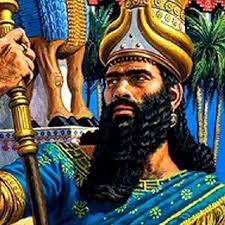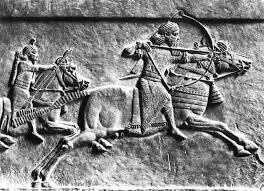I Am Going to Give Egypt
to Nebuchadnezzar King of Babylon
Ezeki’el 29: 17-21
I am going to give Egypt to Nebuchadnezzar king of Babylon DIG: Earlier in this commentary ADONAI depicted Tyre as a ship. How does He depict Egypt? Why is it appropriate? For what two things does God punish Pharaoh? How reliable was Egypt as a military ally (Second Kings 18:19-21)? How will ELOHIM punish Egypt? When will God re-gather her? How does this compare with the fate of Ammon (Ezeki’el 25:7)? Tyre (Ezeki’el 26:14)? Or Isra’el (20:36-38)? Why might the horn in Ezeki’el 29:21 symbolize power (First Samuel 2:1 and Psalm 92:10)?
REFLECT: Does God work in your life without you knowing it? On hindsight, when do you recall this happening? How does YHVH reveal His actions and plans to you? How can you better understand and fit in with His purposes? Is it good to rely on others or is it wiser to be as independent as possible? How would you define: (a) Dependence? (b) Independence? (c) Inter-dependence? Do you think Nebuchadnezzar attacked Egypt, and later Tyre, out of a conscious obedience to God? How do you see that playing out in the world today?
The prophecy was fulfilled in Nisan, 571 BC
The outcome of this conflict is silent, but the passage reveals that the conquest of Egypt was literally carried out by Nebuchadnezzar. Although reference is made to the Babylonian emperor, the prophecy is, in fact, addressed to Egypt and in substance it’s related intimately to the prophet’s earlier prophecy addressed to Tyre (Ezeki’el 26:1 to 28:19).384
Ezeki’el’s fifth near historical prophecy against Egypt came on the first day of the first month of the twenty-seventh year of Nebuchadnezzar’s reign, the word of ADONAI came to me (Ezeki’el 29:17). This near historical prophecy was fulfilled in 571 BC sixteen years after it had been given in 587 BC. Many years earlier he described Egypt’s coming judgment, and now the prophet indicates exactly who would bring the judgment.

Son of man, Nebuchadnezzar king of Babylon drove his army in a hard campaign against Tyre; every head was rubbed bare and every shoulder made raw (see the commentary on Isaiah, to see link click Eq – The Timeline for Tyre). Yet he and his army got no reward from the campaign he led against Tyre (Ezeki’el 29:18). The thirteen-year siege against Tyre had not been materially successful. The army, wearing helmets and carrying materials for the siege, had no reward for their arduous labors. The Tyrians were able to send off their wealth, according to the statement of Jerome, out of the reach of the Babylonian army. Without the booty he could not pay his army, so he turned to Egypt to take its wealth. Nebuchadnezzar was thus unconsciously the instrument of God against Egypt.385
Therefore, this is what Adonai ELOHIM says: I am going to give Nebuchadnezzar king of Babylon the spoils of Egypt and he will carry off its wealth. He will loot and plunder the land as pay for his army. Not only was the wealth of Egypt taken, but the Egyptians themselves were taken as slaves back to Babylon. These were the wages for his army. I have given him Egypt as a reward for his efforts because he and his army did it for Me by destroying Tyre, declares Adonai ELOHIM (Ezeki’el 29:19-20). God will use pagan kings and leaders, as well as the Adversary and his demons, to fulfill His goals and desires.

It is true that Nebuchadnezzar imposed a stunning and devastating defeat on Egypt at the battle of Carchemish. Although he did not occupy the entire nation of Egypt, his victory over Egypt at Carchemish made him the major power in the region, and Egypt was subject to him through tribute. Then, much later in 568 BC Nebuchadnezzar did in fact actually invade Egypt proper. A fragmentary historical document indicates that Nebuchadnezzar actually campaigned in Egypt himself, subjugating parts of the country during the rule of Amasis. Naturally, during this campaign, Nebuchadnezzar took massive amounts of treasure, as prophesied by Ezeki’el.386
When that day comes I will cause a horn to grow, for power to return to the house of Isra’el. Here Ezeki’el is using the well-known figure of the budding forth of a horn, in short, the ancient glory of a nation would come back to life. With the fall of Egypt, the affairs of Isra’el would rise again. And I will enable you [Ezeki’el] to open your mouth among them. The ceremonial muteness of Ezeki’el will end. This was promised in Ezeki’el 24:26-27 and will finally be fulfilled in Ezeki’el 33:22. Then they will know that I am ADONAI (Ezeki’el 29:21 CJB).387
Egypt’s failure to live up to the hopes of Isra’el is what we all feel when we try to “help God out” either physically or spiritually. Our efforts to please ADONAI are doomed to failure because, no matter how alluring, they will all turn out to be just a [broken] walking stick, a mockery instead of a support. Only one sure foundation exists through the ages; it is the rock of ages. All other ground is quicksand – Trust in the Lord forever, for the Lord, the Lord, is the rock eternal (Isaiah 26:4).388



Leave A Comment